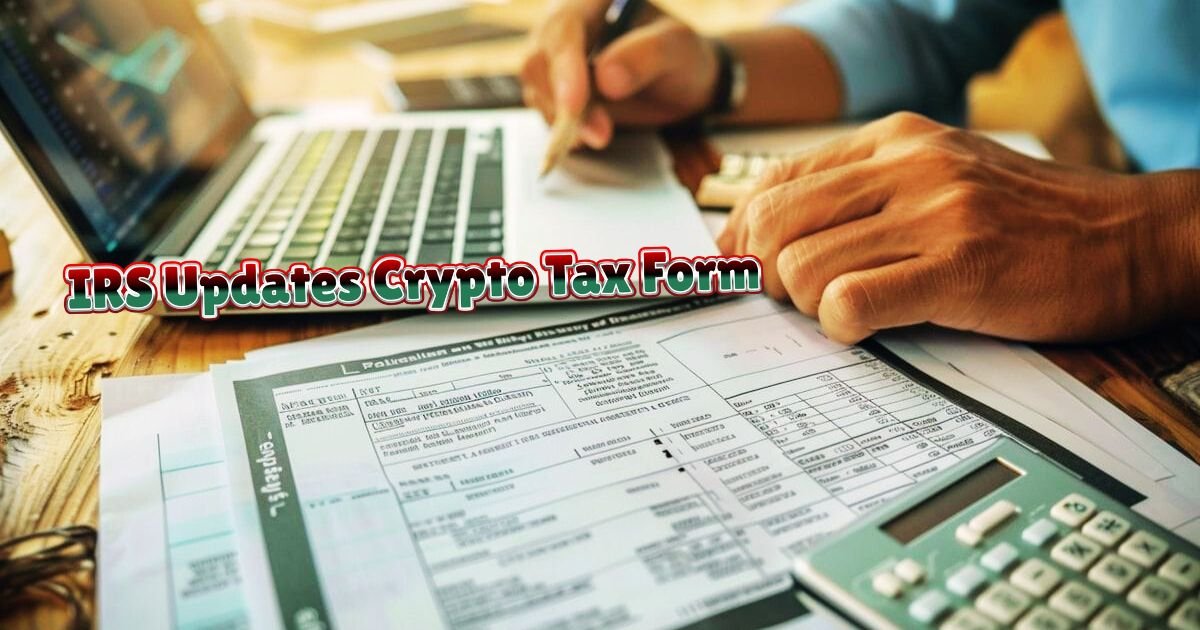The IRS Updates Crypto Tax Form regime will begin to cross into impact for 2025 taxes, even though a few debatable components stay to be worked out.
The cutting-edge draft shape removed asking U.S. taxpayers the time of day a crypto transaction occurred and identifying the “dealer type.”
Read More: Bitcoin Network Transactions
The U.S Internal Revenue Service (IRS) has unveiled an updated Form 1099-DA for reporting virtual asset transactions, introducing fundamental changes that could address past criticism and privacy problems. This new edition, reportedly set to be partly applied in 2025, removes several contentious factors from earlier drafts.
- The new U.S. Tax shape for crypto buyers’ brokerage accounts is out, and it’s been narrowed in giant methods from an earlier model.
- Crypto’s 1099 form will “carry greater ease and clarity” for those paying U.S. Crypto taxes, consistent with IRS officers.
The U.S. Internal Revenue Service (IRS) has launched an updated draft version of the tax shape crypto brokers and traders will use to record proceeds from positive transactions, the 1099-DA.
Beginning in 2026, crypto investors who use agents – which, for now, essentially manner centralized crypto exchanges like Coinbase and Kraken – will acquire the 1099-DA from those agents to document positive crypto sales and trade transactions to the IRS as taxable activities.
The United States Internal Revenue Service (IRS) has updated its draft form for taxpayers to report virtual asset transactions starting in 2026.
In an Aug. 8 notice, the IRS launched a draft of Form 1099-DA, “Digital Asset Proceeds From Broker Transactions.” If authorized by the tax provider, the shape could allow U.S. taxpayers to record crypto transactions from 2025 by using the submitting cut-off date in April 2026.
IRS Revamps Crypto Reporting Form
On Aug. 8, 2024, the IRS rolled out the revised Form 1099-DA, marking any other full-size shift in how virtual asset transactions may be mentioned to the tax government. Starting with the 2025 tax year, this up to date shape will no longer require filers to consist of their crypto wallet addresses and transaction I.D.s.
This previous element sparked full-size privacy concerns by the crypto community following the release of an initial draft in April 2024. The first draft of Form 1099-DA ignited controversy because of its extensive statistics series requirements, which demanded transaction specifics and pocket addresses related to the transactions.
The up-to-date version of the 1099-DA launched Friday is more streamlined than the first draft of the tax reporting form floated using the IRS in April. The spaces for investors to write off their pocket addresses and transaction I.D.s – which raised substantial privacy concerns when the shape was first unveiled – were eliminated. There is also now no demand to consist of the time of the applicable transactions, just the date.
The authentic shape additionally protected a field asking the filer to discover which sort of dealer they are, consisting of “kiosk operator,” “digital asset fee processor,” “hosted pockets issuer,” “unhosted pockets provider,” and “different” as the alternatives. That container is now not included in the updated model of the form.
Compared to the draft launched in April, the contemporary proposed 1099-DA removed a box asking taxpayers to identify the “broking type” for digital asset transactions. It removed asking filers for the best time of day the transaction came about in preference to just the date. The draft also eliminated areas for taxpayers to report wallet addresses and transaction I.D.s.
At the time, critics argued that such precise reporting could expose digital asset holders to heightened protection risks and threaten the pseudo-anonymity many in the crypto space cherish. Including unhosted pockets companies among the ones required to report this data was particularly alarming to privacy advocates.
The IRS’s present day revision also not requires crypto brokers to identify the type of brokerage they function, making the reporting process smoother. While some have welcomed those changes, there is nonetheless skepticism about the overall impact of the new reporting requirements because the IRS continues refining its approach to taxing virtual assets.
The updated form is “massively advanced/much less burdensome and requires extensively much less records reporting,” wrote crypto lawyer Drew Hinkes, a Miami-based associate at law corporation K&L Gates,
This draft of the 1099-DA comes months after the IRS launched its finalized regulations for crypto broking reporting necessities. The IRS has stated that it plans to offer guidelines for decentralized and non-custodial brokers in a specific set of guidelines later this year.
IRS Commissioner Danny Werfel stated the up to date form would “provide greater clarity for taxpayers and supply them some other device to help them appropriately file their virtual belongings transactions.” K&L Gates legal professional Drew Hinkes said on X that today’s model of Form 1099-DA turned into “massively advanced,” “less burdensome,” and required “extensively much less” statistics reporting.
IRS Updates Crypto Tax Form
“These seem like welcome modifications that CCI and enterprise endorsed for,” said Ji Kim, chief legal and coverage officer for the Crypto Council for Innovation, in an Aug. Nine X put up.
The IRS has opened a 30-day public comment length on the present-day draft of Form 1099-DA, indicating that further changes will probably be made before the final version is launched. However, the timing for the shape’s final launch is still uncertain. The replacement cautions that Form 1099-DA continues to be a “draft” and taxpayers should now not “document draft paperwork” or “depend upon the draft bureaucracy, instructions, and pubs for submitting.
The new Form 1099-DA will help taxpayers comply with the complex global of virtual belongings,” said IRS Office of Digital Asset Initiative Directors Raj Mukherjee and Seth Wilks in an emailed declaration. “It enhances the 6045 broker regulations released recently and affords a car wherein taxpayers can report their in-scope virtual asset gains and losses, beginning in tax year 2025. This is a vital digital asset fact reporting breakthrough and will carry extra ease and readability to that method.
The IRS invited users to submit remarks on the draft form within 30 days. Many in the industry criticized the April model as overly strict, requiring reporting the time of the transactions and a vast range of activities.
In June, the tax carrier released a very last draft of its crypto broker reporting necessities, announcing that decentralized exchanges and self-custody wallets would no longer concern the policies. Werfel stated at the time that the requirements had been geared toward last the tax hole by preventing filers from hiding taxable income.
The United States Internal Revenue Service has up to date the draft of its crypto taxation form 1099-DA for crypto brokerage money owed.
“As a refresher, that is the form that ‘agents’ will start the use of in 2025 to file virtual asset transactions to clients,” wrote Ji Kim, Head of Global Policy, Digital Assets, and General Counsel at the Crypto Council for Innovation, at the social media platform X. “Initial overview displays that this draft form eliminated, among different things, pockets addresses, transaction I.D.s and time obtained. These are vital changes.”
This draft of the 1099-DA comes months after the IRS released its finalized rules for crypto broker reporting necessities. The IRS has stated that it plans to offer policies for decentralized and non-custodial agents in a distinctive set of regulations later this year.
“The new Form 1099-DA will assist taxpayers in following the complicated global of digital assets,” stated IRS Office of Digital Asset Initiative Directors Raj Mukherjee and Seth Wilks in an emailed announcement. “It enhances the 6045 dealer policies launched currently and gives a vehicle wherein taxpayers can report their in-scope digital asset gains and losses, starting in tax year 2025. This is a vital step forward inside the virtual asset facts reporting and could carry extra ease and readability to that method.”
The IRS, alongside the U.S. Department of the Treasury, first proposed the crypto brokerage taxation form in August 2025. Early drafts of the shape required filers to put up digital pockets to cope with and notice whether the property is a “non-protected protection.” However, participants inside the crypto enterprise raised privacy issues regarding how taxation reporting should affect the decentralized finance industry.
FAQs
Q1: What is the new IRS crypto tax form called?
- A1: The new IRS crypto tax form is called Form 1099-DA.
Q2: What major change has been made to the crypto tax form?
- A2: The IRS has removed the requirement to report wallet addresses on the new Form 1099-DA to address privacy concerns.
Q3: Who needs to use Form 1099-DA?
- A3: Crypto brokers and investors who engage in certain transactions involving digital assets need to use Form 1099-DA.
Q4: What types of transactions must be reported on Form 1099-DA?
- A4: Transactions such as selling, trading, and using crypto to buy goods must be reported on Form 1099-DA.
Q5: How does the IRS classify cryptocurrencies for tax purposes?
- A5: The IRS classifies cryptocurrencies as property, not currency, which affects how they are taxed.
Q6: What are some taxable events involving cryptocurrencies?
- A6: Taxable events include selling crypto for regular money, trading one token for another, using crypto to buy goods, and receiving crypto as payment.
Q7: What are some non-taxable events involving cryptocurrencies?
- A7: Non-taxable events include buying crypto with regular money, moving tokens between your own wallets, and donating crypto to approved charities.
Q8: What should taxpayers do to prepare for crypto tax reporting?
- A8: Taxpayers should gather all transaction records, calculate gains/losses for each transaction, and use Form 8949 and Schedule D to report them.
Q9: How can taxpayers ensure they are reporting crypto transactions correctly?
- A9: Taxpayers can use crypto tax software to simplify reporting and consult a tax professional familiar with crypto regulations.
Q10: Where can I find more information about the updated crypto tax form?
- A10: More information can be found on the IRS website and other reputable tax news sources.












